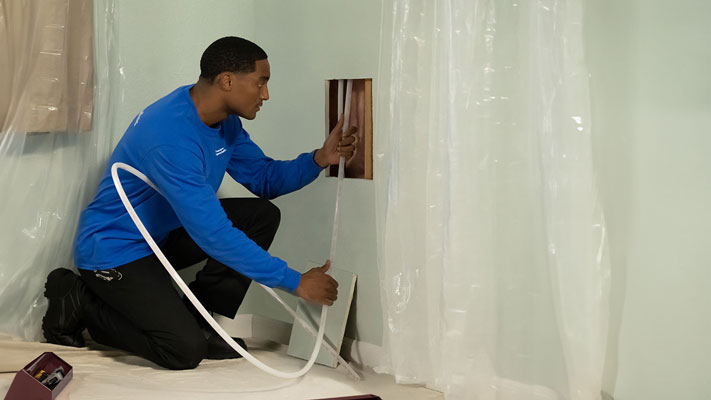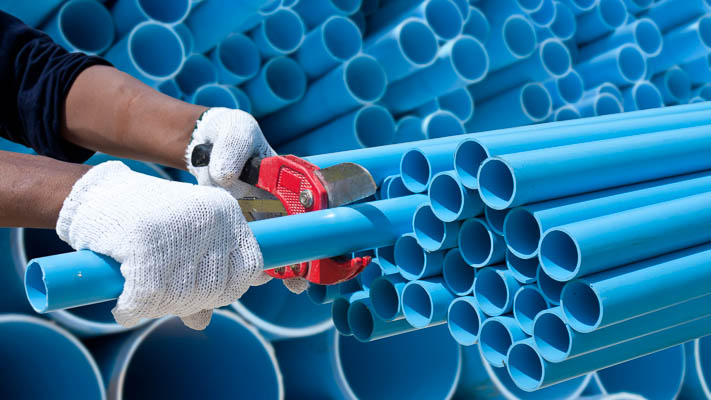What's the Difference Between PEX and PVC Pipes?
PEX (cross-linked polyethylene) and PVC (polyvinyl chloride) are both types of plastic piping, but they're built for different purposes.
PEX tubing is designed for water supply lines (both hot and cold) and is known for its flexibility and durability. It can easily curve around obstacles, requires fewer fittings, and handles temperature changes extremely well. Because of this, it's commonly used for repiping freshwater systems inside homes. For more information, we have a detailed article about what PEX tubing is.
PVC pipes, on the other hand, are rigid and typically used for cold water or drainage applications. You'll often find them in irrigation systems, vent lines, and waste pipe systems. While lightweight and affordable, PVC is not suitable for hot water lines because it can warp or degrade when exposed to high temperatures.
Here's a quick side-by-side summary:
- PEX is flexible and heat-resistant, ideal for interior water supply lines.
- PVC is rigid and limited to cold water, better suited for drain and vent applications.
- PEX can handle temperatures up to 200°F, while PVC is limited to around 140°F.
- PEX connects with crimp or expansion fittings; PVC uses solvent welding and primer.
In short, these materials aren't interchangeable. If you're dealing with a freshwater supply system (especially one that carries both hot and cold water) PEX is the more advanced and reliable choice.
Is PVC Cheaper Than PEX for Plumbing?
Yes, but that's only part of the story. PVC is often cheaper up front. It's a rigid material with lower production and shipping costs. However, cost comparisons should take installation, lifespan, and application into account — especially when planning a whole-home repipe.
Here's what to consider:
- Material Cost: PVC is generally less expensive per foot. PEX (especially premium-grade PEX-A) costs more, but not significantly when scaled to a full system.
- Labour and Installation: PEX's flexibility makes it faster to install. It can bend around corners and weave through walls, requiring fewer fittings and cuts. PVC is more time-consuming to install. Its rigidity requires more cutting and gluing, especially when navigating tight spaces.
- Longevity and Maintenance: PEX tubing is resistant to scale, corrosion, and freezing. PEX has an incredibly long life expectancy — designed to last 50+ years. PVC, especially when used outside its optimal range (e.g., with hot water), may fail prematurely or require repairs.

So, while PVC might seem cheaper at the outset, PEX often proves more cost-effective over the long term — especially when considering performance, lifespan, and labor savings.
For a more detailed breakdown, we have an article dedicated to the cost of repiping with PEX tubing.
Get your free estimate today
With over 75,000 repipes completed, we've perfected our One-Stop Repipe™ for your home.
PEX vs PVC: Which Is Better for Your Home?
When it comes to whole-home repiping, PEX is almost always the better choice for fresh water systems. Here's why:
- Durability: PEX is designed to expand slightly under pressure, which helps it resist cracking in cold weather. It's also less affected by aggressive water chemistry that can damage older materials like PVC.
- Temperature Tolerance: PEX can safely carry both hot and cold water, making it ideal for showers, taps, and water heaters. It is also more freeze-resistant compared to other pipe materials. PVC simply can't handle the same range without risk of warping or damage.
- Installation Flexibility: PEX can be fed through walls and ceilings in long, continuous runs with fewer fittings. This reduces the chance of leaks and speeds up the installation process.
Unless you're specifically working on an outdoor drain, vent, or irrigation system, PEX outperforms PVC in nearly every category when used for potable water lines inside the home.
Get a Free Quote for PEX Repiping Today
At Repipe Specialists, we've replaced damaged and outdated plumbing in thousands of homes since 1991. We've seen firsthand how PEX repiping outperforms older materials like PVC. A full-home repipe is a smart, long-term investment, especially when using corrosion-resistant Uponor PEX-A tubing. We often exceed expectations when it comes to:
- Speed: Our repipe crews typically complete a repipe in a day, returning on another day for wall patching.
- Convenience: Through our One-Stop Repipe™ process, we handle everything from permits, to wall patching, to inspections.
- Cleanliness: Our crews are trained to protect your home while working (we cover all surfaces with protective sheeting), and to clean up fully at the end of each day.
- Peace of Mind: Repipe Specialists is a fully licensed plumber in every state we operate in, and we back all of our repipes with a lifetime warranty.
- Financing programs: To help take the sting out of unplanned repipe expenses, we offer several financing programs.
- Price: As a specialist that performs hundreds of repipes a week, we can deliver high quality repipes at a lower cost vs generalist plumbers. Our quotes typically range from $4,500 to $15,000 depending on the size and complexity of your project. We have an article that covers repipe cost factors in detail.
Schedule a free in-home consult and meet with a local repipe consultant. We'll walk you through all your PEX repipe options and provide a written, fixed-price quote. Ditch PVC limitations – upgrade to PEX and repipe with confidence.

